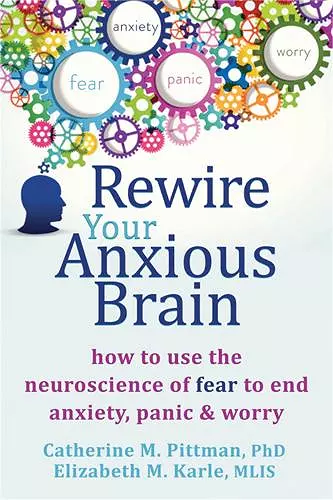Rewire Your Anxious Brain
How to Use the Neuroscience of Fear to End Anxiety, Panic and Worry
Catherine M Pittman author Elizabeth M Karle author
Format:Paperback
Publisher:New Harbinger Publications
Published:26th Mar '15
Should be back in stock very soon

Feature in New Harbinger monthly e-Newsletter *Book Alert to Anxiety Disorders and CBT communities *Banner feature on New Harbinger website homepage *Goodreads giveaway Feature in New Harbinger monthly e-Newsletter *Book Alert to Anxiety Disorders and CBT communities *Banner feature on New Harbinger website homepage *Goodreads giveaway Print Ads: *Features in New Harbinger consumer and professional catalogs *Advertising in Psychotherapy Networker and the annual conference guides of the American Psychological Assocation and the Anxiety and Depression Assocation of America Publicity: *Print campaign to psychology, book trade, health, and science publications *Online campaign to psychology, self-help, anxiety, brain and mind, and science websites and blogs *Local TV and radio campaign *Outreach to brain science organizations TIPFeature in New Harbinger monthly e-Newsletter *Book Alert to Anxiety Disorders and CBT communities *Banner feature on New Harbinger website homepage *Goodreads giveaway Print Ads: *Features in New Harbinger consumer and professional catalogs *Advertising in Psychotherapy Networker and the annual conference guides of the American Psychological Assocation and the Anxiety and Depression Assocation of America
Do you ever wonder what is happening inside your brain when you feel anxious, panicked, and worried? In Rewire Your Anxious Brain, psychologist Catherine Pittman and author Elizabeth Karle offer a unique, evidence-based solution to overcoming anxiety based in cutting-edge neuroscience and research.
In the book, you will learn how the amygdala and cortex (both important parts of the brain) are essential players in the neuropsychology of anxiety. The amygdala acts as a primal response, and oftentimes, when this part of the brain processes fear, you may not even understand why you are afraid. By comparison, the cortex is the center of "worry."
That is obsessing, ruminating, and dwelling on things that may or may not happen. In the book, Pittman and Karle make it simple by offering specific examples of how to manage fear by tapping into both of these pathways in the brain.
As you read, you'll gain a greater understanding how anxiety is created in the brain, and as a result, you will feel empowered and motivated to overcome it. The brain is a powerful tool, and the more you work to change the way you respond to fear, the more resilient you will become. Using the practical self-assessments and proven-effective techniques in this book, you will learn to literally "rewire" the brain processes that lie at the root of your fears.
“From fears to phobias and panic, this how-to guide unravels the mysteries of worry, then delivers strategies that will lead you to a resilient life.”
—Reid Wilson, PhD, author of Don't Panic
“Fear, worry, anxiety, panic, and depression block individuals from living fully. This book does an excellent job of unraveling the mysteries of the brain and how it causes anxiety, thus allowing individuals to take control of their symptoms and manage their lives more effectively. I have used the concepts in this book in treating veterans with PTSD and have seen people become much more functional. Highly-recommended reading.”
—Susan Myers, RN, LCSW, BCD, holistic nurse and board certified diplomate in clinical social work
"This is a unique contribution to a wide array of self-help books for those who suffer with anxiety. The authors explain what we know about the workings of the brain in a fluid style that neither talks down to nor overwhelms the reader. This science becomes the foundation for decreasing bewilderment, fear, and shame. There are straightforward and logical recommendations for modifying patterns of anxiety that originate from, and are maintained by, differing brain circuitry.”
—Sally Winston PsyD, codirector of the Anxiety and Stress Disorders Institute of Maryland
"Catherine Pittman, a trained behavioral scientist, brings her deep scientific understanding of fear, anxiety, and learning to the world of personal experiences. Few scientists can make this transition from scientific communication to public communication. Pittman, along with coauthor Elizabeth Karle, does this very well indeed. Readers should not be put off by the early presentations of brain mechanisms, because they are surprisingly readable and informative. Moreover, it is information that provides a foundation for readers who have anxiety challenges to use later as they develop effective coping strategies. Readers should find the clear expositions of the where’s, why’s, and how’s of anxiety and its management to be an anxiety-reducing
read.”
—J. Bruce Overmier, PhD, professor emeritus in the graduate faculties of psychology, neuroscience, and cognitive science at the University of Minnesota
ISBN: 9781626251137
Dimensions: 228mm x 152mm x 16mm
Weight: 320g
224 pages